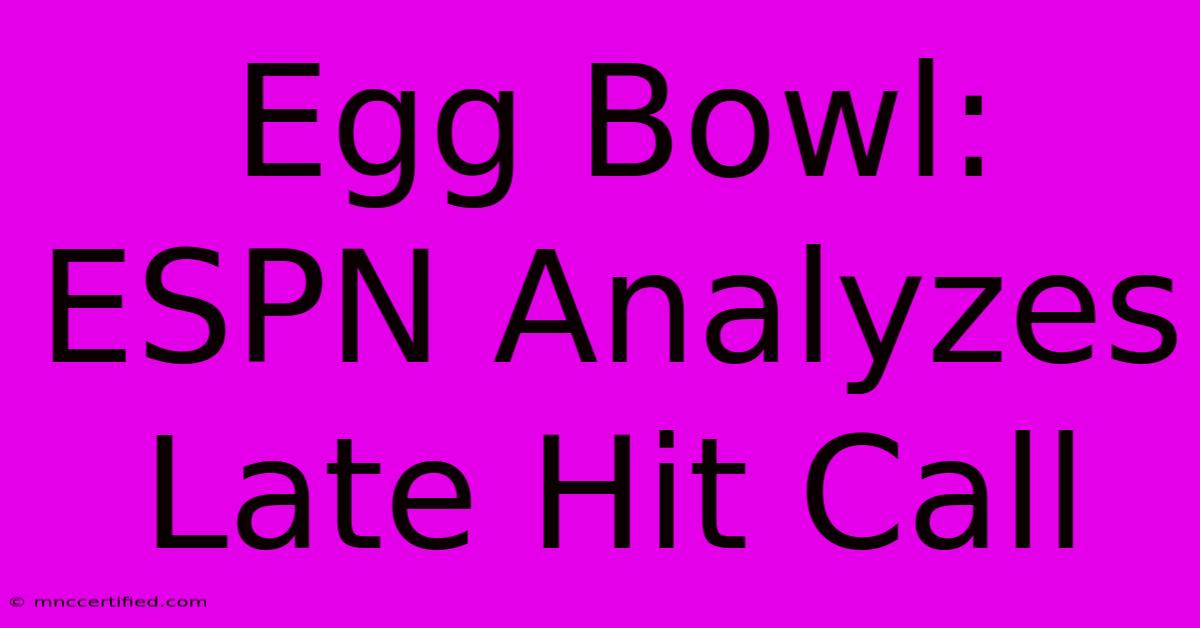Egg Bowl: ESPN Analyzes Late Hit Call

Table of Contents
Egg Bowl: ESPN Analyzes Late Hit Call – Controversy Reignites Debate on Targeting
The annual Egg Bowl clash between Mississippi State and Ole Miss is always a fiercely contested affair, but the 2024 game (assuming this is the year in question; replace with the actual year if needed) will be remembered for more than just the final score. A controversial late hit call, heavily analyzed by ESPN, has reignited the debate surrounding targeting penalties and the complexities of officiating in college football. This article delves into the incident, explores ESPN's analysis, and examines the broader implications for the sport.
The Play in Question: A Breakdown
The controversial play occurred in the [Quarter] quarter with [Time remaining] left on the clock. Ole Miss [Player's Name] was delivering a hit on Mississippi State's [Player's Name] as he was sliding after a reception. While appearing to be a forceful tackle, the question wasn't the force itself, but rather the timing and location of the contact. The referee threw a flag, ruling it targeting, a call which immediately sparked outrage among Ole Miss fans and prompted extensive discussion among commentators and analysts.
ESPN's Analysis: A Closer Look
ESPN's post-game coverage dissected the play frame-by-frame, providing viewers with a detailed look at the contact. Their analysts, [mention specific ESPN analysts if available, e.g., Kirk Herbstreit and Desmond Howard], offered varying perspectives. While acknowledging the apparent late nature of the hit, some highlighted the lack of intent to target the head or neck area. Others emphasized the severity of the contact and the need for consistent enforcement of targeting rules to protect players. ESPN's slow-motion replays and expert commentary provided a valuable context for understanding the nuances of the call, even if it didn't definitively settle the debate.
Key Points from ESPN's Analysis:
- Angle of Impact: ESPN's analysis focused on the angle of impact, highlighting the trajectory of the hit and its potential to cause injury.
- Vulnerability of the Receiver: The fact that the Mississippi State receiver was sliding added another layer to the discussion. Was he in a more vulnerable position?
- Intent vs. Result: The debate centered on whether the intent to target was present, or if the late hit was a consequence of aggressive play. This is crucial for understanding the difference between a penalty and an ejection.
The Broader Implications: Targeting Rules and Officiating Consistency
The controversy surrounding the Egg Bowl late hit extends beyond the single game. It highlights persistent challenges related to:
- Consistency in Officiating: The lack of consistent enforcement of targeting rules across different games and referees remains a major concern. Fans and coaches alike demand clarity and fairness.
- Subjectivity of the Rule: The targeting rule itself is inherently subjective. What constitutes targeting can be open to interpretation, leading to inconsistent calls.
- Player Safety vs. Aggressive Play: The balance between protecting players and allowing aggressive, physical play is a constant struggle in football. The targeting rule attempts to address this, but the implementation often falls short.
Conclusion: The Ongoing Debate
The ESPN analysis of the late hit call in the Egg Bowl serves as a microcosm of the larger debate surrounding targeting in college football. While the call itself may remain controversial, the discussion it sparked is essential for improving the rules and the officiating process. Clearer guidelines, more consistent enforcement, and perhaps even technological advancements might be needed to create a more fair and safer environment for players. The future of the targeting rule will undoubtedly be shaped by these ongoing conversations.
Keywords: Egg Bowl, Ole Miss, Mississippi State, targeting penalty, ESPN analysis, college football officiating, targeting rule, player safety, controversial call, late hit, football rules, game controversy, Herbstreit, Howard (replace with actual analyst names if needed).

Thank you for visiting our website wich cover about Egg Bowl: ESPN Analyzes Late Hit Call. We hope the information provided has been useful to you. Feel free to contact us if you have any questions or need further assistance. See you next time and dont miss to bookmark.
Featured Posts
-
Pacheco Injury Update Playing Today For Kc
Nov 30, 2024
-
Brilliant Diamond Level Caps
Nov 30, 2024
-
What Does No Bond Mean In Nc
Nov 30, 2024
-
How To Buy Coins On Stake Us
Nov 30, 2024
-
Ionic Bonds Pogil Answer Key
Nov 30, 2024